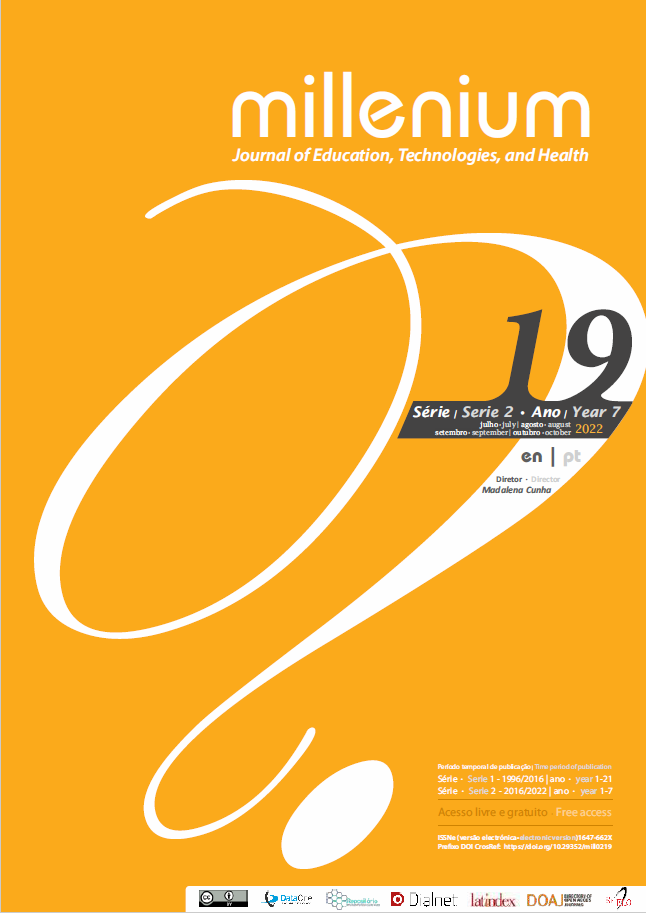Philosophies, theories, and models used in occupational nursing
a review protocol
DOI:
https://doi.org/10.29352/mill0219.27779Keywords:
models nursing, nursing research, nursing theory, occupational health nursing, philosophy nursingAbstract
Objective: Identify nursing philosophies, theories and conceptual models applied to occupational health nursing.
Method: Integrative review protocol, according to the six-stage proposal of Toronto and Remington in the year 2020, the WoS, PUBMED, SCOPUS and BVS databases will be consulted; after applying the filters, the summaries of each article will be read, those that meet the previously defined inclusion and exclusion criteria will be extensively reviewed; The quality control of the results will be through the evaluation scale of articles with heterogeneous methodologies for integrative reviews.
Results: The results will be presented in narrative format, grouping the identified philosophies, theories, and conceptual frameworks into three categories: i. nurse as worker; ii. client as worker; iii. environmental health.
Conclusion: It is expected that the review provides guidance on the use of theoretical frameworks to address health situations in occupational nursing, paying tribute to the excellent quality that nursing must have in the management of occupational health care.
Downloads
References
Fawcett, J. (2017). Applying conceptual models of nursing, quality improvement, research, and practice. 1st ed. New York: Springer Publishing Company. https://usermanual.wiki/m/68d3e394a142ad86a78f0b6f7de3122b6711764437fd2cfe57f8f452a435fe2c.pdf
Kutcher, A. M., & LeBaron, V. T. (2022). A simple guide for completing an integrative review using an example article. Journal of Professional Nursing: Official Journal of the American Association of Colleges of Nursing, 40, 13–19. https://doi.org/10.1016/j.profnurs.2022.02.004
Naranjo-Hernández, Y. (2020). Impronta de la obra de Florence Nightingale en la formación de recursos humanos de Enfermería. Revista Información Científica, 99(6), 609-619. http://www.revinfcientifica.sld.cu/index.php/ric/article/view/3100
Nightingale, F. (1860). Notes on Nursing: What it Is, and what it is Not. New York: D. Appleton and Company.
Topcu, S., & Ardahan, M. (2019). Occupational health nursing and pioneer leaders from past to present. International Journal of Caring Sciences, 12(3), 1931–1935. http://www.internationaljournalofcaringsciences.org/docs/68_topku_review_12_3.pdf
Toronto, C.E., & Remington, R. (2020). A step-by-step guide to conducting an integrative review. Cham, Switzerland: Springer International.
Valencia-Contrera, M. A. (2022a). Necesidad de enfermeros especialistas en salud ocupacional. ENE, Revista de Enfermeria, 16(1), 1–3. http://ene-enfermeria.org/ojs/index.php/ENE/article/view/1340
Valencia Contrera, M.A. (2022b). Escala de evaluación de artículos con metodologías heterogéneas para revisiones integrativas. Revista Cuidarte, 13(2), e2744. https://doi.org/10.15649/cuidarte.2744
Valencia-Contrera, M. A., & Orellana-Yañez, A. E (2022). Fenómeno techo de cristal en enfermería: revisión integrativa. Revista Cuidarte, 13(1), e2261. http://dx.doi.org/10.15649/cuidarte.2261
Downloads
Published
How to Cite
Issue
Section
License
Copyright (c) 2022 Millenium - Journal of Education, Technologies, and Health

This work is licensed under a Creative Commons Attribution 4.0 International License.
Authors who submit proposals for this journal agree to the following terms:
a) Articles are published under the Licença Creative Commons (CC BY 4.0), in full open-access, without any cost or fees of any kind to the author or the reader;
b) The authors retain copyright and grant the journal right of first publication, allowing the free sharing of work, provided it is correctly attributed the authorship and initial publication in this journal;
c) The authors are permitted to take on additional contracts separately for non-exclusive distribution of the version of the work published in this journal (eg, post it to an institutional repository or as a book), with an acknowledgment of its initial publication in this journal;
d) Authors are permitted and encouraged to publish and distribute their work online (eg, in institutional repositories or on their website) as it can lead to productive exchanges, as well as increase the impact and citation of published work
Documents required for submission
Article template (Editable format)





